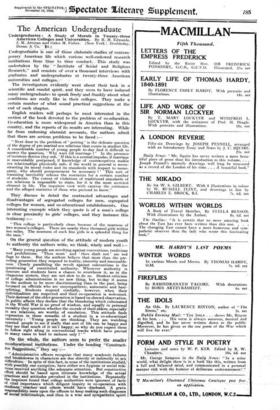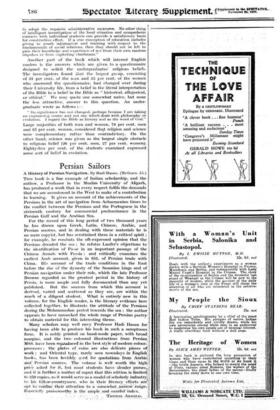The American Undergraduate
Undergraduates : A Study of Morale in Twenty-three American Colleges and Universities. By R. H. Edwards, J. M. Artman and Galen M. Fisher. (New York : Doubleday, Doran & Co. - $4.) Undergraduates is one of those elaborate studies of contem- porary American life which _various well-endowed research institutions from time to time conduct. This study was .
undertaken by the " Institute of Social and _Religious Research," and consists of over a thousand interviews with graduates and undergraduates at twenty-three American universities and colleges.-- '
The investigators evidently went about their task in a scientific and candid spirit, and they seem to have induced many undergraduates to speak freely and frankly about what conditions are really like in their colleges. They make a certain number of what sound practical suggestions at the end of each chapter.
English readers will perhaps be most interested in the section of the book devoted to the problem of co-education. Co-education is more widespread in America than in this country, and the reports of its results are interesting. 'While far from endorsing alarmist accounts, the authors admit that there are serious problems to be faced :- "Next door to the problem of petting' is the delicate question of the degree of pre-marital sex relations that exists in student life. A considerable number of young people to-day find it difficult to answer the question, Why wait till marriage ? ' In the presence of insistent desires they ask, ' If this is a normal impulse, if marriage is unavoidably poitponed, if knowledge of contraceptives makes sex relationships physically safe, if the world in general is recon- structing its moral codes and its standards with respect to mono- gamy, why should postponement be necessary ? ' This sort of reasoning inevitably relaxes the restraints for a certain number of students. The extent of violations of traditional standards of sex relations is impossible to state, for it is the most secreted element in life. The inquirers view with caution the estimates and the alleged statistics of those who pretend to know."
They discuss in detail the contrasted advantages and disadvantages of segregated colleges for men, segregated colleges for women, and co-educational establishments. One interesting example which they quote is of a man's college in close proximity to girls' colleges, and they instance this testimony :—
" This college is particularly clean because of the nearness of two women's colleges. There are nearly three thousand girls within ten-miles. The itearness of-such fine girls is a splendid thing for the men."
On the.general question of the attitude of modern youth to authdritY the authors write, we think; wisely and well :— " Many young people are revolting against conventions, traditions and prohibitions. Thou must' and thou shalt not' are red flags to them. But the authors believe that more than the pre- ceding generation they respond to reality, sincerity and reasonable- ness.' Closely paralleling the revolt against conventions is the questioning of constituted authority. Wherever authority is insecure and students have a chance to overthrow it, as in the chaperone system, they are not slow to do so. Student criticism of college administrators , is no new thing, but to-day it seems to the authors to be more discriminating than in the past, being focussed on officials who are unsympathetic, autocratic and hair- splitting. Students respond cordially, however, when their individualities are respected- and their co-operation is welcomed. Their distrust of the older generation is based on shrewd observation. in,pnblic affairs -they declare that the blundering which culminated in the World War is no proof of wisdom, and equally in personal morality theY question whether the morals of their elders, especially in sex relations, are worthy of emulation. This attitude finds expression in these remarks of a student in a co-educational university : `Young people are thinking. They are watching married people to see if really that sort of life can be happy and they see that much Of it isn't happy; so why do you expect them to follow right along in conventional tracks which have proved in many cases to lead to sadness only ? "
On ttie___whole, the authors seem_ to prefer_ the smaller eor,edueational institutions. Under the heading "Construct- ive Suggeitioni," ey say :—
" Administrative officers recognize that many academic failtues and breakdowns in characters are due directly or indirectly ici
diffictilties.- In spite of this fact, in none of the institutions Studigd,-; with possibly one exception, have either sex hygiene or social tions:received any-thing like.adequate.attention. But constructive effort should be based upon intimate knowledge of the actual 'Practices and attitudes prevalent in the institutions. Repeatedly the inquirers found that college authorities were ignorant of facts of vital importance which diligent -inquiry in co-operation with students;'-ettaches- -end others - would - have - disclosed. A grave responsibility rests upon the officers to keep making such diagnoses of social relationships, -and-then in a wise and sympathetic spirit to adopt the requisite administrative measures. No other thing of intelligent. investigation of the local situation and sympathetic contacts with individual students can provide a satisfactory basis for constructive effort. If a true conception of education includes giving to youth information and training with respect to the fundamentals of social relations, then they -should not be left to gain their knowledge and experience of sex from their own random impulses or from exploiting charlatans."
Another part of the book which will interest English readers is the answers which are given to a questionnaire designed to solicit the undergraduates' religious beliefs. The investigators found that the largest group, consisting of 31 per cent. of the men and 35 per cent. of the women who answered the- questionnaire, had changed over during their University life, from a belief in the literal interpretation of the Bible to a belief in the Bible as " historical, allegorical, or ethical." We may quote one somewhat naive, but none the less attractive, answer to this question. An under- graduate wrote as follows :-
" Its significance has not changed, perhaps because I am taking an engineering course and not one which deals with philosophy or evolution. I regard the Bible as history and as the word of God."
Large majorities of both men and women, 78 per cent. men and 85 per cent. women, considered that religion and science were complementary rather than contradictory. On the other hand, science was given as the largest single obstacle to religious belief (26 percent. men, 27 per cent. women). Eighty-five per cent. of the students examined expressed some sort of belief in evolution.



















































 Previous page
Previous page